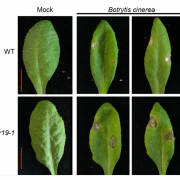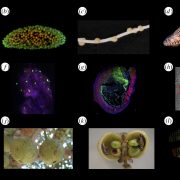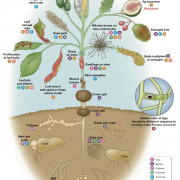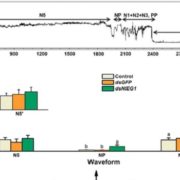The role of the seventh subfamily of cytoplasmic receptor kinases in plant immunity revealed by genetics
Source: Institute of Genetics and Developmental Biology Published: 2018-07-09 http://www.cas.cn/syky/201807/t20180704_4657120.shtml Translation by Google
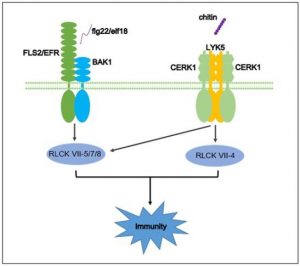
Function of RLCK VII members in plant immunity
Pattern recognition receptors (PRRs) on plant cell membranes recognize some of the conserved molecular patterns derived from pathogens that activate immune responses. The current study found that the receptor-like cytoplasmic kinase subfamily VII (RLCK VII ) BIK1 and PBL1 are involved in plant PRR- mediated immune responses. There are 46 members of RLCK VII in Arabidopsis, and the function of most members of this family in plant immunity is unknown.
The research group of the Institute of Genetics and Developmental Biology of the Chinese Academy of Sciences constructed a number of multiplex mutants based on the phylogenetic tree of RLCK VII , and systematically analyzed the function of RLCK VII members in plant immunity. Studies have found that members of the fifth, seventh and eighth evolutionary branches of RLCK VII are widely involved in multiple PRR- mediated immune responses. The members of the fourth evolutionary branch are specifically involved in the chitin-induced immune response. Further studies indicate that members of the fourth evolutionary branch are involved in MAPK activation. This study revealed the redundancy and specificity of RLCK VII members in PRR- mediated immune responses. The mutants constructed in this work provide a good genetic material for studying the function of RLCK VII members.
The findings were published online June 15 in Plant Physiology. Rao S, Zhou Z, Miao P, Bi G, Hu M, Wu Y, Feng F, Zhang X, Zhou J-M (2018) Roles of receptor-like cytoplasmic kinase VII members in pattern-triggered immune signaling. Plant Physiology (DOI: 10.1104/pp.18.00486). Zhou Shaomin’s Ph.D. graduate student Rao Shaofei and assistant researcher Zhou Chaoyang are co-first authors. The research was funded by the National Natural Science Foundation of China, the Strategic Pilot Science and Technology Specialist of the Chinese Academy of Sciences, and the State Key Laboratory of Plant Genomics.



